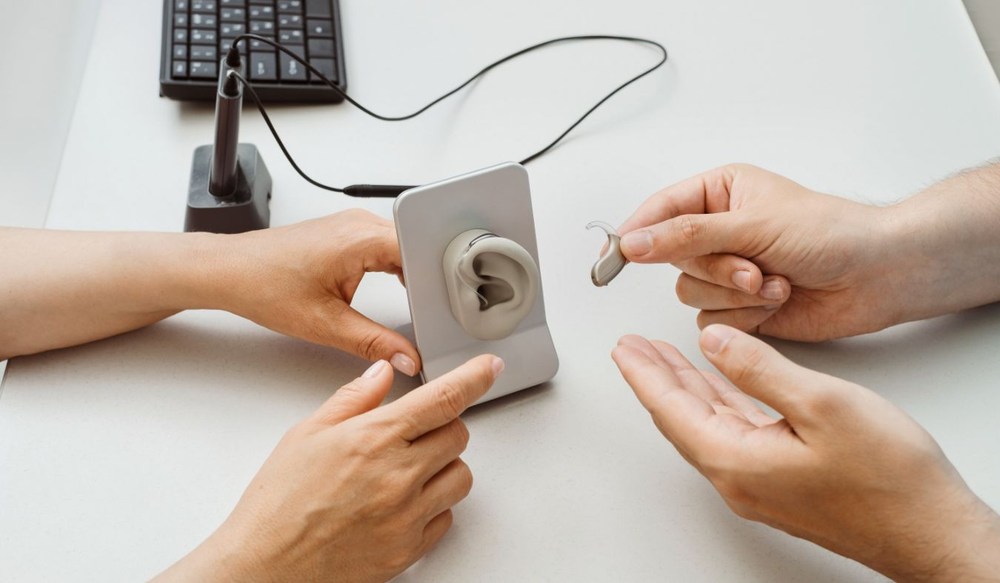From Communities To Classrooms: Hearing Care for All Children
The Audiology Offices today joins the World Health Organization and its

By: admin | May 23, 2025
When seasonal allergies strike, they affect more than just your nose and eyes – they can also interfere with your hearing aids. The sneezing, congestion and ear pressure that come with allergies can change how sounds reach your ears, while excess moisture from watery eyes or increased ear wax can affect how your hearing aids function. If you’ve noticed your hearing aids working differently during allergy season, you’re not imagining things. These seasonal changes require adjustments to maintain the hearing quality you depend on.
Your hearing aids are precision instruments designed to work with your unique hearing needs, but they don’t automatically adapt to the physical changes allergies bring. Symptoms like swollen ear canals, fluid buildup or even the simple act of wiping watery eyes can shift how your devices fit and perform. When your hearing aids don’t work as expected, your daily conversations, ability to enjoy entertainment and overall confidence can suffer. Taking proactive steps to adjust your hearing aids during allergy season helps ensure you stay connected to the people and activities that matter to you, even when pollen counts are high.
Spring brings not just beautiful blooms but also bouts of sneezes and sniffles. Yep, we’re talking about seasonal allergies. But did you know that these allergies can affect your hearing as well? They can lead to congestion and inflammation in your ear passages, which might change the way you hear. When allergens like pollen, dust mites or mold get into your system, they trigger your immune response. This leads to inflammation in your nasal passages, throat and the Eustachian tubes in your ears, which can affect your ability to hear clearly.
That’s because our ears, nose and throat are all interconnected in a system called the “upper respiratory tract.” When allergies cause your nasal passages to swell, it can block the Eustachian tubes, which are responsible for equalizing the pressure between your middle ear and the outside environment. This buildup of pressure can create a feeling of fullness or pressure in your ears and might even cause a temporary reduction in hearing. So, if you notice your hearing feels a bit “off” during allergy season, it’s likely not just your imagination – it’s your body responding to those allergens. Thankfully, once the allergies settle down, your hearing should return to normal. However, if hearing issues persist or worsen, it might be worth getting checked out to rule out any other underlying conditions.
The impact of allergies on your hearing might be temporary, but it’s important to adjust your hearing aids to accommodate these changes. Hearing aids are adaptable tools designed to cater to each user’s unique needs. During allergy seasons, you might need to tweak the settings of your devices for the best performance. Some modern hearing aids come with customizable settings that allow users to adjust the volume and frequency response according to their current needs. If you’re experiencing a feeling of fullness or pressure in your ears due to allergies, adjusting these settings could help relieve some discomfort and ensure that you’re still able to hear clearly.
It’s always a good idea to get advice from an audiologist if you’re unsure about making these adjustments yourself or if you notice significant changes in your hearing during allergy season. They can provide expert guidance and help ensure that your devices are working their best despite any temporary changes caused by seasonal allergies.
Seasonal allergies can complicate your hearing aids’ performance, but you’ve got this! With some know-how and the right approach, you can ensure that your devices always meet your changing needs.
During allergy seasons, when you’re dealing with symptoms like ear fullness or pressure, adjusting the settings of your hearing aids can help. Consider getting advice from an audiologist who can guide you through this process and help fine-tune your device’s performance during these times.
Allergy medications can provide much-needed relief during allergy season, but they may also have some unintended effects on your hearing. Many allergy medications, particularly antihistamines, work by blocking the histamine response, which helps reduce symptoms like sneezing, itching and congestion. However, some antihistamines can also dry out your nasal passages and reduce the moisture needed for the Eustachian tubes to function properly.
When this happens, the tubes may become blocked or unable to regulate pressure in the middle ear effectively, leading to a feeling of fullness or temporary hearing loss. This can make sounds seem muffled or distant, which can be frustrating when you’re trying to follow conversations or enjoy your environment.
In addition to antihistamines, decongestants are commonly used to clear up nasal congestion caused by allergies. These medications work by shrinking the blood vessels in the nasal passages to open up airways. While they can reduce nasal swelling and help you breathe easier, they can also cause side effects, such as a feeling of pressure in the ears or temporary hearing changes.
If decongestants are used for prolonged periods, they can also dry out the mucous membranes, which may worsen Eustachian tube dysfunction. If you notice changes in your hearing after taking allergy medications, discuss your symptoms with a healthcare provider to ensure you’re managing your allergies without compromising your ear health.
When seasonal allergies strike, your hearing aids may not work as well as they usually do. If you start noticing things like reduced sound quality, muffled voices or difficulty hearing clearly, it might be time for a check-up. These changes in performance could indicate that your hearing aids need cleaning, adjustment or even a battery replacement. If sounds seem to be weaker or you’re having trouble understanding speech, it’s important to address these issues before they affect your daily activities.
Another sign that your hearing aids need attention is increased feedback or whistling sounds. If your hearing aids are making unusual noises, or if they feel uncomfortable or loose in your ears, it could be a sign that the fit has been altered, possibly due to the congestion or moisture caused by allergies. Also, pay attention to any changes in the clarity of the sound – if you’re noticing that certain sounds or frequencies are hard to hear, your hearing aids may need fine-tuning. If you notice any of these issues, it’s a good idea to have them professionally checked to ensure they’re performing at their best, especially during allergy season when environmental factors can affect how well they function.
When dealing with seasonal allergies, it’s important to know how to manually adjust your hearing aids. This process can be simplified into a few easy steps. The goal is to ensure that your hearing aids continue providing the best possible support, even when allergies are trying to get in the way.
First, familiarize yourself with the different settings on your hearing aids. Many modern devices come equipped with digital features that allow you to control volume and frequency response levels. During allergy season, if you’re experiencing changes in your hearing due to congestion or inflammation in your ear passages, adjusting these settings could help relieve some discomfort and maintain clarity of sound.
While these adjustments can often be made by users themselves, always remember that guidance from a professional is invaluable. If you’re unsure about making changes or if there’s a significant shift in your hearing during allergy season, don’t hesitate to ask for help from an audiologist. They are there not only for regular check-ups but also for those times when allergies may be causing unexpected challenges with your devices.
Technology has transformed hearing aids from their early versions. Today’s devices come equipped with automatic adjustment features that can be a game-changer, especially during allergy seasons. These hearing aids can detect changes in your listening environment and adjust themselves accordingly – it’s like having a personal hearing assistant!
These devices use advanced algorithms to continually analyze your surroundings. They pick up on subtle cues like background noise, speech patterns and even the level of ambient sound. Based on this analysis, they automatically tweak various settings like volume and frequency response to provide you with the best possible listening experience at all times.
For instance, if you’re in a noisy environment where it’s harder to hear conversations clearly due to temporary changes in your hearing caused by seasonal allergies, these smart devices will recognize this issue and adjust their settings to amplify speech sounds while suppressing background noise.
This automatic adjustment feature is particularly useful during allergy seasons when your hearing might fluctuate due to congestion or inflammation caused by allergies. It ensures that despite these temporary changes in your hearing ability, you still get an optimal auditory experience without having to manually adjust the settings of your device every time.
During allergy season, keeping your hearing aids clean and functioning well is crucial, as allergens like pollen and dust can build up in your devices and impact their performance. One of the easiest ways to maintain your hearing aids is by regularly cleaning them to remove any debris or moisture. You can use a soft, dry cloth to wipe down the outer parts and a small brush to gently clean the microphones and vents. Make sure to follow your hearing aid’s specific cleaning instructions to avoid damaging sensitive components. Additionally, using a drying kit or dehumidifier overnight can help prevent moisture buildup, which is common during allergy season, especially if you’re experiencing congestion or excess earwax.
It’s also important to check the batteries frequently during allergy season, as excessive moisture or dust buildup can affect their longevity and performance. If you notice any signs of weak sound quality or distortion, consider replacing the batteries, even if they aren’t dead yet, to ensure your hearing aids are working at their full potential. Keeping your hearing aids clean and dry not only helps maintain their effectiveness but also extends their lifespan.
As allergy season hits, it’s important to be mindful of how these seasonal changes can affect the performance of your hearing aids. The discomfort from nasal congestion, increased earwax or fluid buildup can alter how your hearing aids fit and function. Keeping up with regular maintenance, cleaning and adjustments is key to preventing sound distortion or any issues with amplification.
If you’ve noticed any changes in how your hearing aids are working this allergy season, it might be time for an expert adjustment. At The Audiology Offices in Virginia, we’re ready to help you address any issues. You can reach us in Gloucester at (804) 791-5011, Kilmarnock at (804) 567-7005 or Warsaw at (804) 494-6080. We’re here to make sure your hearing aids are working at their best, so you can stay connected and experience life clearly.

The Audiology Offices today joins the World Health Organization and its
By: admin | February 25, 2026

Many people notice that their own voice sounds different when they first
By: admin | January 19, 2026

As 5G wireless networks expand and become more widespread, you might
By: admin | November 18, 2025
